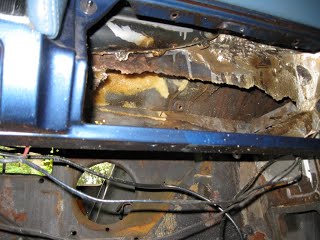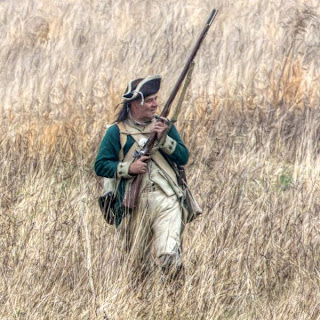The coarse grinder disc cut its way through layers of old body filler, creating a thick layer of dust on the floor. When the grinder disc made its way through all of the old filler down to the metal of the fender, large pockets of rust appeared. The bottom edge of the fender had rusted through leaving a large hole several inches in diameter.
There isn't a word in the old car hobby that is more dreaded than the word "rust.” It's the automotive equivalent to cancer. Rust is bad news. I knew that my little Rambler American had some rust bubbling through to the surface before I began to repaint it, but I was surprised by how extensive the rust was.
After driving the little Rambler almost three years, I decided to give it a fresh coat of paint. There were rust bubbles on the front fenders and the rocker panels. I knew that I would need to do some rust repair. What I didn’t realize was that sometime in the past there had been extensive rust repair on the little car that hid the extent of the problem. By the time that I had completed the repairs, I had to fabricate patch panels and even build a portion of the rocker panel from scratch.
Every old car enthusiast wants to find a car that is rust free, but it is rare to find a decades-old vehicle without signs of rust. Today’s cars are not nearly as rust prone as older vehicles. Manufacturers are using better pre-production treatments, more use of galvanized metals, aluminum, plastics and composites, and smarter design but, rust hasn’t quite been banished. In places where the roads are salted in the winter, the effect of that salt on cars is brutal. Anytime that you have unprotected metal surfaces, rust is inevitable.
As I was repairing the rust on my Rambler, I was reminded of the words of Jesus in the Sermon on the Mount. “Don’t store up treasures here on earth, where moths eat them and rust destroys them, and where thieves break in and steal. Store your treasures in heaven, where moths and rust cannot destroy, and thieves do not break in and steal. Wherever your treasure is, there the desires of your heart will also be.” Matthew 6:19-21 (NLT)
Here Jesus tells us not to place too much value in the things of this world. If you treasure them as the most important things in your life, one day you will find yourself very disappointed when they are devalued, destroyed, or stolen. Is Jesus telling us that we should not have any possessions here in this world? Of course not. But he is telling us that treasures on earth are subject to being eaten, corroding or being stolen. Treasures in heaven are secure. They will remain.
What do you treasure? I enjoy my little Rambler. When I drive it, it brings a smile to my face. But rust had damaged the Rambler, and even though I have repaired the rust, it will eventually come back. Jesus is telling us that whatever we have here on this earth will not last. Even if our “treasure” consists of gemstones such as diamonds and rubies, and precious metals such as gold and silver that resist rusting, it isn’t secure. Even though it may resist corrosion very well, there is still the age-old problem of other people wanting those items without paying you for them. They break in and steal them.
We understand what treasures are here on earth, but what did Jesus mean by “treasures in heaven?” I have heard many preachers use this verse to tell me why I should give my money to the church. While that might be part of it, I’m quite certain that is not what Jesus had in mind. He wants us to use our time, energy and finances to pursue after those things that are of eternal value; Those things that will have value in heaven, not on earth.
“Treasures in heaven” are things of worth in the kingdom of heaven, such as justice and respect for the dignity of every person. Jesus implies that we should invest our money in activities that transform the world, instead of accumulating earthly treasures. The Ten Commandments start with these words; “You shall have no other gods before Me.” Exodus 20:3 (NKJV) When our heart is set on on the things of this earth, we are no longer serving God. We have put our treasures above God, and we are serving them. They have become our god and our life. Jesus challenges us to ask ourselves where our treasure is. If your treasure is on earth and the things of this world, your heart will be there as well. If your heart is focused on Jesus and on laying up treasures in heaven, your heart will be there.
Gentle Reader, the Bible says “set your mind on things above, not on things on the earth.” Colossians 3:2 (NKJV) Does this mean that Jesus wants us to be paupers? No, the Bible is also clear that God values hard work. “Lazy people want much but get little, but those who work hard will prosper.” Proverbs 13:4 (NLT) So, how are we to understand the difference between appropriate and inappropriate attention to “treasures on earth?” Jesus answers, “don’t worry and say, ‘What will we eat?’ or ‘What will we drink?’ or ‘What will we wear?’ The people who don’t know God keep trying to get these things, and your Father in heaven knows you need them. Seek first God’s kingdom and what God wants. Then all your other needs will be met as well.” Matthew 6:31-33(NCV) Remember that Ramblers rust, “but the word of the Lord endures forever.” 1 Peter 1:25 (NKJV)






























































